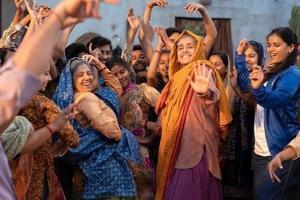Saand Ki Aankh is a rare film about two women (played by Taapsee Pannu and Bhumi Pednekar), that fails the Bechdel Test, because, in every scene, they have to either deal with or talk to/about men!

Taapsee Pannu and Bhumi Pendnekar in a still from Saand Ki Aankh. Picture Courtesy: Instagram Account/Taapsee Pannu
Saand Ki Aankh
U/A: Drama
Director: Tushar Hiranandani
Cast: Taapsee Pannu, Bhumi Pendnekar, Vineet Kumar Singh
Rating: 
There's something so desperately missing in the general rhythm and tone of this film that beyond a point, not just the audience, even the filmmakers seem unable to decide on whether this is a high-octane melodrama, set to appease junta-class. Or a sweet, subtle rural story hinged on minimalist, authentic realism, packed with lighter moments, that would instantly draw in connoisseurs, as it must.
This isn't to suggest whatsoever that the two forms (of story-telling) are exclusive to each other. Hell, no. But melodrama, I reckon, truly works in its rationing — to rise to an occasion; to make a monument out of a moment. It loses impact with repetition. Unless, perhaps, the whole movie is consistently that — a drama version of slapstick humour, as it were.
Frankly, this film lacks that sense of occasion. You want the big moments to hold. But they fly in and fly past, before you can feel anything at all. What with that cheap-ass, loud background score to start with — insecurely calling attention to every scene, driving you semi-nuts, instead of letting such compelling characters cruise you through a script that's got everything to subtly and surely pull it off, with all possible mainstream accoutrements, so to say.
We all know it's frickin' hard to strike that balance. Who's done it best (in the past)? Actor-producer Aamir Khan. Not saying this because Dangal (2016) — for its setting (rural North India), backdrop (sport), and lead-characters (female) — is somewhat similar to Saand Ki Aankh.
But also the fact that the aged protagonists this picture is based on — the Tomar sisters-in-law (Chandro, Prakashi) — first became nationally known, after appearing in Khan's talk-show Satyamev Jayate, back in 2012. They had accidentally picked up shooting as a sport. This is when they were well into their 60s (if I'm not mistaken). Thereafter these 'Shooter/Revolver Dadis' began to hit bull's eye (or saand ki aankh, if you may) at national championships for veterans.
Check out the trailer here:
Specifically, what was it about the 'dadi ke nuskhe' type stuff these ladies were privy to that they could crack a sport otherwise reserved for the privileged, with years of training? The film, even in a fictionalized kinda way, doesn't throw light into this at all. Besides that they pick up the pistol, one fine day, and find themselves among the top in the game. A Good Samaritan (Vineet Kumar) guides them through — chiefly for love and (their) fresh air, it seems.
This is effectively a rare film about two women, that miraculously fails the Bechdel Test, because in every scene, they have to either deal with, or talk to/about men! That's of course as indicative of the world they inhabit — forced by their husbands to limit their life to kitchen, kids, and khet. No knock. Just that you find these side folk kaafi fake — from the suave maharaja, to slick boys behaving like mawaalis. Director Prakash Jha playing the household patriarch, of course, stands out as the unusual casting choice.
That said, Saand Ki Aankh, as you're aware, is essentially centred on two extremely young female lead actors in Bollywood (Bhumi Pednekar, 30; Taapsee Pannu, 32), playing perhaps two of the oldest female lead characters on screen, ever. Both Chandro and Prakashi are way past usual retirement age, to embark on altogether fresh starts.
What strikes you about both Pednekar and Pannu isn't as much the fact that they can get the old-age mannerisms right — in terms of walk/talk, posture, prosthetics, etc — as how effortlessly they seem to slip into characters so far removed from their own. And they do it with a level of excitement and extreme conviction that it instantly spills over from the screen.
Pednekar, from the sense I get, has in fact built her entire career so far (Dum Lagake Haisha, Shubh Mangal Saavdhaan, Toilet: Ek Prem Katha, Sonchiriya, Lust Stories) splendidly adapting to parts that are almost polar-opposites to her social self. She is indisputably a powerhouse of talent, with a knack to go the extra mile. So is Pannu, of course. But at no point do you find them jealously jostling for audience's appreciation. It's almost like they've signed a non-competitive clause, to complement each other on screen, rather than show off who's the real boss-lady here.
Both are. Or, rather both aren't, since the film is so much about two vulnerable champions, smartly railing against the world, and slyly taking it on as well. As a subject, it is as good as it gets. It's infinitely superior to anything that debutant director Tushar Hiranandani has touched before (his writing credits include over-the-top blockbusters Grand Masti, Great Grand Masti, etc).
No doubt, you are already in love with the two delicately deadly Dadis on screen. How can you not? They exude such natural warmth, and rare sense of joy, despite having been dealt the worst cards ever. Which makes me feel worse that you don't end up loving the movie as much. But then again, that's me; you can always give it a shot.
Catch up on all the latest entertainment news and gossip here. Also download the new mid-day Android and iOS apps to get latest updates
 Subscribe today by clicking the link and stay updated with the latest news!" Click here!
Subscribe today by clicking the link and stay updated with the latest news!" Click here!









